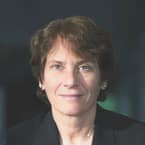
Scientific Areas of Expertise: Chemical Biology, Glycoscience, Immunology
For visionary contributions to the Nobel Prize-winning development of click chemistry through the invention of bioorthogonal chemistry; for profiling alterations in cell surface glycosylation associated with cancer, inflammation, and bacterial infection; and for spearheading the development of novel therapeutic modalities for immuno-oncology.
An innovative thinker at the intersection of biology and chemistry, Dr. Bertozzi is revered for her invention of bioorthogonal chemistry and her foundational work in glycobiology, in which her pioneering work has increased understanding of cellular glycosylation in cancer and led to novel therapeutic approaches. Her work on bioorthogonal chemistry allowed for biologically-inert chemical reactions to be carried out in vivo with minimal toxicity. Dr. Bertozzi’s research team subsequently applied this revolutionary technique to reveal the biology of cellular glycans and their spatiotemporal dynamics during development. Bioorthogonal chemistry has since unleashed a wave of scientific progress in molecular visualization, imaging, diagnostics, and therapeutics. For her seminal work in this field, Dr. Bertozzi received the 2022 Nobel Prize in Chemistry, together with Drs. Morten Meldal and K. Barry Sharpless.
Dr. Bertozzi has applied her visionary scientific approaches involving glycobiology to study cancer cell interactions with the immune system with the goal of improving immuno-oncology treatment strategies. Importantly, her work has uncovered the molecular mechanism by which increased sialylated glycans on cancer cell surfaces promote tumor immunoevasion. In a revolutionary approach to combat the effects of cancer cell hypersialylation, her research group developed a technique for precision editing of the cellular glycocalyx using engineered antibody-enzyme conjugates to remove sialic acids specifically from cancer cells, allowing for proper immune cell responses. In another innovative therapeutic approach at the interface of chemistry and biology, her team harnessed endogenous lysosomal degradation pathways to degrade cellular proteins of interest, many of which have previously been considered undruggable. This strategy now offers tremendous potential for innovative applications in cancer treatment.
Selected Awards and Honors
2023 AACR Award for Outstanding Achievement in Chemistry in Cancer Research, Philadelphia, Pennsylvania
2023 Roger Adams Award in Organic Chemistry, American Chemical Society, Washington, DC
2022 Nobel Prize in Chemistry, Royal Swedish Academy of Sciences, Stockholm, Sweden
2022 Wolf Prize in Chemistry, Wolf Foundation, Herzlia Pituach, Israel
2022 Lifetime Mentor Award, American Association for the Advancement of Science, Washington, DC
2020 Chemistry for the Future Solvay Prize, Brussels, Belgium
2020 John J. Carty Award for the Advancement of Science, National Academy of Sciences, Washington, DC
2016 Award in the Chemical Sciences, National Academy of Sciences, Washington, DC
2011 Heinrich Wieland Prize, Boehringer Ingelheim Foundation, Mainz, Germany
2011 Tetrahedron Young Investigator Award, Philadelphia, Pennsylvania
2010 Lemelson-MIT Prize for Global Innovation
2008 Roy L. Whistler International Award in Carbohydrate Chemistry, Victoria, Australia
2007 Ernst Schering Prize, Berlin, Germany
2002 Elected Fellow, American Association for the Advancement of Science, Washington, DC
1999 MacArthur Foundation “Genius” Award, Chicago, Illinois
[Institutional affiliations listed for Fellows reflect those held at the time of their induction into the AACR Academy.]